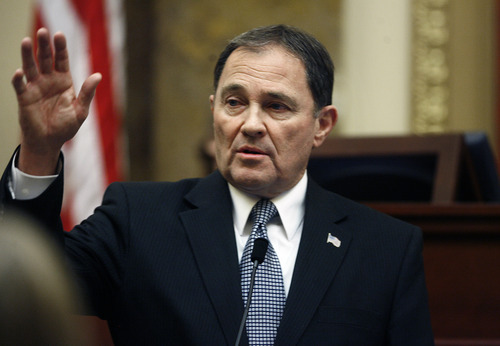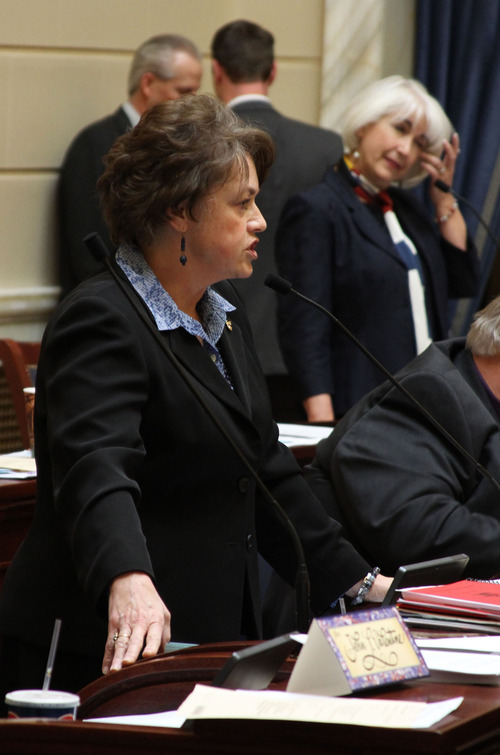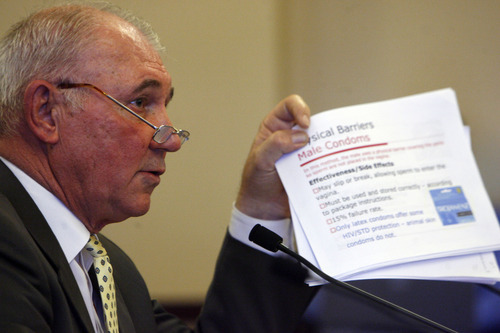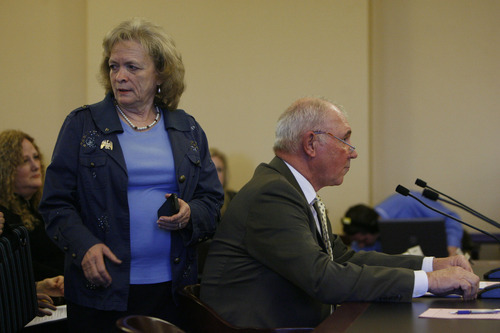This is an archived article that was published on sltrib.com in 2012, and information in the article may be outdated. It is provided only for personal research purposes and may not be reprinted.
Gov. Gary Herbert vetoed a controversial bill Friday evening that would have allowed school districts to drop sex education and required abstinence-only instruction in those that kept it.
It was a decision that followed pressure by thousands of Utahns on both sides of the issue since lawmakers passed HB363 last week. Utahns flooded the governor's office with thousands of letters; more than 40,000 people signed an online petition against it; hundreds rallied against it at the Capitol this week; and a variety of groups took public stands.
In rejecting the bill Friday, Herbert said that sex education is an emotional topic and instruction should stress the importance of abstinence, but not interfere with parents' ability to determine how their children are instructed.
"After careful review of existing law and following extensive discussions with stakeholders on both sides of the issue," Herbert said, "I am convinced the existing statutory framework respects these two principles, while HB363 simply goes too far by constricting parental options."
Herbert's spokeswoman, Ally Isom, said the governor decided to veto the bill shortly after 7 p.m. Friday. His action came the day the bill arrived on his desk. Herbert made the announcement on his Twitter account.
"I just vetoed HB363," he wrote. "I cannot sign a bill that deprives parents of their choice."
Gayle Ruzicka, president of the Utah Eagle Forum, which supported the bill, called the governor's action a "sad day for the children of Utah."
The governor met with Ruzicka on Friday afternoon to discuss the issue, then called her Friday evening and told her he planned to veto the measure.
"It never entered our minds that the governor who told us he was conservative would veto such an appropriate piece of legislation," she said. "By vetoing this bill, he just sent the message that Utah's stamp of approval [is] on teaching children how to have sex, teaching contraception and saying this is the safest way to have sex."
Sen. Margaret Dayton, co-sponsor of the bill, said she was disappointed the governor hadn't contacted her to discuss his concerns and said teaching children about contraception is comparable to telling kids not to do drugs, then showing them how to "mainline" heroin.
She said the bill would have allowed students to be taught the biology of reproduction, but not contraception, abortion, alternative lifestyles and stimulation, things she said that Planned Parenthood was offering to students.
"What was one of the major goals of running the whole bill was to make sure we de-couple the State Office of Education from the Planned Parenthood Web site and vice versa," she said.
The State Office of Education, however, had already pulled its official approval of a Planned Parenthood presentation last year that has been used as part of fifth- and sixth-grade lessons on maturation, not sex education. Some had objected to that presentation partly because the website that hosted the presentation also included links to more explicit information about sex on Planned Parenthood's separate, main website.
Attempts to reach Rep. Bill Wright, R-Holden, House bill sponsor of HB363, for comment, were not immediately successful Friday night.
Opponents of the bill, however, were thrilled with Herbert's decision. Those against the bill had said it would have weakened parental choice, and they worried that some teens, ignorant of the consequences of unprotected sex, would face increased risk of pregnancy and disease.
"I'm so relieved," said Liz Zentner, president-elect of the Utah PTA, which had encouraged Herbert to veto the bill. "I was so worried. It was going to cause problems and I just felt bad for the parents and the kids because this was really a big step backward. They need to have information."
Kory Holdaway, government relations director for the Utah Education Association (UEA), which had also urged a veto, said he was "encouraged" by the decision.
"Frankly, we're grateful that he saw the wisdom of vetoing that and granting parents their right of opting into a program educating their children," he said shortly after learning of the veto. "We're pleased and grateful that he's looking out for the health and best interests of children."
And Paul Krueger, the Murray school bus driver who started an online petition urging the governor to veto the bill last week, said he believes the outcry against the bill, such as from the more than 40,000 people who signed his petition, made a difference. Bill supporters had criticized the petition, saying anyone from anywhere could sign it. In response, bill opponents said earlier this week they pulled the names that were obviously fake or from out of state and still counted about 32,000 signatures.
"I think it's the right thing to do for the children of Utah, and the whole state really," Krueger said of the veto Friday. "I thought the proposed law was going to be dangerous for students because they weren't going to get the information they needed to protect themselves."
Herbert's action came the night after Utah Republicans held their political caucuses, where they chose delegates who will pick the party's nominee at the state convention April 21.
Ruzicka said she doesn't know if the veto will become an issue in the governor's re-election bid. He is being challenged by five Republicans for the party's nomination. Democratic challenger Peter Cooke had said he would veto the bill if he were in office.
Utah Democratic Party Chairman Jim Dabakis said the veto was the right decision, but it was wrong to do it late on a Friday night. The Utah State Democratic Party had also publicly called for the veto.
"Utahns deserved more leadership from this governor on the issue," Dabakis said. "He shouldn't have waited until after the caucuses to ask permission from his own party to take a stand. We need a strong governor, who isn't afraid to be a leader, and who isn't afraid of our Legislature."
Isom said politics were not a consideration of the timing of the veto.
"The governor's process was driven solely by his effort to hear both sides, understand the issues and explore the issues," she said. In addition, there are other bills he is also considering. "It simply took this amount of time for him to arrive at his decision."
Herbert also noted in his veto letter that under existing Utah law, parents must give permission in writing before their students can attend portions of any health class dealing with human sexuality.
A recent Tribune survey of the state's largest school districts, however, found that the vast majority of parents opt in to the instruction.
HB363 would deprive parents of that option, Herbert said.
"I am unwilling to conclude that the State knows better than Utah's parents as to what is best for their children," he said in his veto letter. "In order for parents to take on more responsibility, they need more information, more involvement, and more choice — not less. I cannot sign a bill that deprives parents of their choice."
Isom said the governor's office had received about 8,000 calls, letters and e-mails on the topic — more than either the immigration issue or the Legislature's revisions to the state's open records law, both contentious issues from the 2011 session.
On the other side, the Eagle Forum and conservative Sutherland Institute mobilized supporters advocating the governor to sign the bill.
Dave Buer, spokesman for The Sutherland Institute, said that the organization's position is based on sound policy and data.
"HB363 reflects the realities of sex education in Utah — abstinence-only curriculum is linked to the lowest STD rates in the state," he said.
He said that data from the health department showed districts with abstinence-only sex education have significantly lower rates of chlamydia.
"If a major goal of sex education is to prevent the negative health consequences of premarital sex, then HB363 represents the most effective approach for children in Utah," Buer said.
However, in 2009, a task force working with the federal Centers for Disease Control and Prevention reviewed studies of 83 comprehensive sex education programs. They found that such programs reduce adolescent risk factors such as engagement in any sexual activity, frequency of sexual activity, number of partners and frequency of unprotected sexual activity. The programs also increase the use of protection against pregnancy and STDs, and reduce the incidence of disease.
The success of such programs prompted the panel to recommend their use. In a similar review of 23 abstinence-only programs, the task force found "insufficient evidence" to recommend them as a strategy for preventing teen pregnancy and STDs.
"The research demonstrates that comprehensive programs are effective," said Robert Johnson, a member of the task force and dean of the New Jersey Medical School. "We're not saying [abstinence-only programs] are of no value. We're just saying, right now, we don't have enough evidence to make a comment."
If it chooses, the Legislature could call itself into session to override the governor's veto. It would take a two-thirds vote in both bodies. Two of Herbert's vetoes were overridden last year.
However, the bill did not receive two-thirds support when it passed the House and some legislators have already expressed regrets for passing the measure.
Sen. Aaron Osmond, R-West Jordan, chairman of the Senate Education Committee, said this week that he and Rep. Daniel McCay, R-Riverton, hoped to meet with interested parties over the coming months to find a solution to the disagreement over sex education, such as by creating an online, at-home program for students whose parents are interested.
Had Herbert signed the bill into law, Utah would have become the first state in the nation to specifically ban instruction in contraceptives in public schools.
Regardless of what they're being taught, Utah teens are having sex — getting pregnant and contracting sexually transmitted diseases (STDs).
In 2010, according to state data, 3,068 babies were delivered to Utah teen mothers, accounting for 5.9 percent of all births. That same year, 1,591 girls and 433 boys 19 and younger were diagnosed with chlamydia.
Patricio Panuncio, a senior at Academy for Math, Engineering and Science charter high school in Murray, said he wrote to his state representative to express his opposition to HB363.
"We have a right to know what we can do to prevent pregnancy and other problems," said Panuncio, 18. "By just ignoring it, you're not resolving anything. You're just adding to the ignorance."
Tribune reporters Rosemary Winters, Janelle Stecklein and Heather May contributed to this report.













